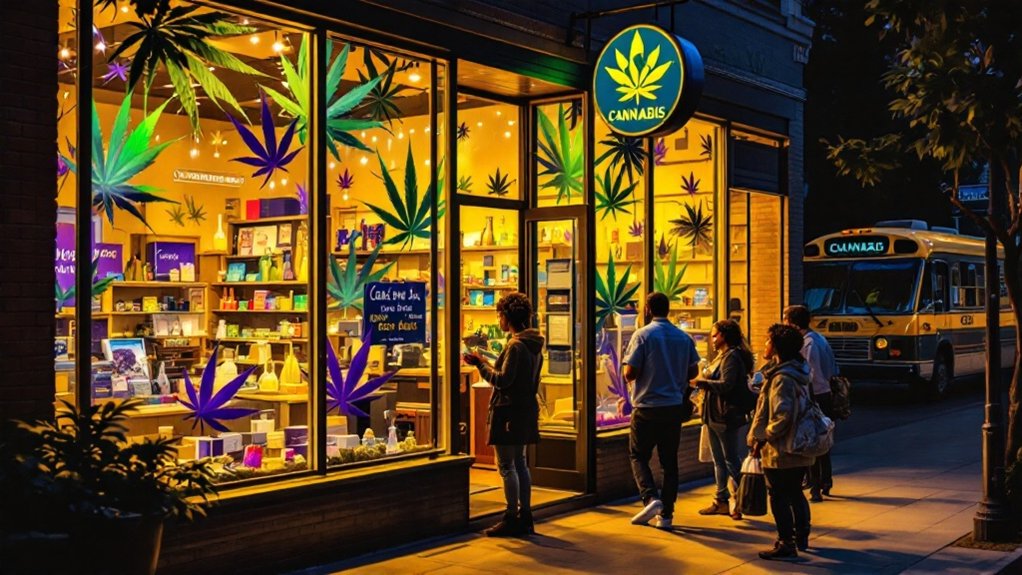Cannabis tourism generated $11.8 billion in 2024, creating an unprecedented opportunity for travelers to drive social justice through their spending choices. Social equity programs across 19 states now certify businesses owned by individuals from communities disproportionately harmed by cannabis prohibition. These certified operators, many of whom are BIPOC and women entrepreneurs, reinvest tourism revenue directly into neighborhood services, job training, and community health initiatives. The question becomes: how can tourists identify and support these equity-focused businesses while maximizing their positive impact?
How Cannabis Tourism Creates Inclusive Environments and Economic Opportunities

As cannabis legalization spreads across jurisdictions, tourism operators are discovering that social equity isn’t just morally imperative, it’s good business.
Programs like Oakland’s Equity Path showcase minority-owned dispensaries and lounges, creating authentic experiences while boosting entrepreneurship among previously marginalized communities. These initiatives prioritize ownership and employment access for individuals impacted by cannabis prohibition.
Cannabis tourism catalyzes economic mobility through targeted support for BIPOC and women entrepreneurs.
Joint ventures between established operators and equity businesses foster skills development. Marketing strategies designed for broad accessibility encourage participation from wider demographics, breaking stigma particularly among communities historically affected by enforcement disparities.
Local tax revenue funds community infrastructure projects in disenfranchised neighborhoods.
Tourism dollars support legal services and civic re-integration programs, creating pathways that transform prohibition’s collateral damage into economic opportunity. These programs are particularly crucial given that only 6.5% of eligible individuals obtain expungement within five years without targeted support. Destination organizations strengthen their role as community brand managers by aligning cannabis tourism initiatives with broader social equity values. Countries like Thailand and Canada have become models for integrating social justice with cannabis tourism, demonstrating how legal frameworks can support economic inclusion.
Behind the grassroots initiatives and community partnerships lies a financial powerhouse that’s reshaping how states approach criminal justice reform. The legal cannabis market generates billions of dollars annually, with substantial portions funding social equity programs nationwide.
Illinois leads with ambitious loan programs, awarding $18.3 million in 2023 and $5.52 million in 2024 to craft growers and dispensaries.
Illinois demonstrates leadership in cannabis social equity with $23.82 million in loans awarded to craft growers and dispensaries over two years.
Connecticut allocates 60-75% of cannabis tax revenue to its Social Equity and Innovation Fund. New Jersey goes further, dedicating 70% of tax revenue plus additional fees totaling $2.6 million for impact zone investments.
These funds target communities historically harmed by prohibition policies. Recipients include Big Brothers Big Sisters, Legal Aid, and Indigenous advocacy groups.
The money flows toward workforce training, healthcare providers, and addiction recovery centers creating measurable change where it’s needed most. These programs work to validate authenticity of businesses seeking funding while ensuring resources reach legitimate community organizations. California has distributed over $40 million in community reinvestment grants as of June 2024, supporting organizations that address barriers to reentry and strengthen community health initiatives.

While billions flow into social equity programs, the operators these initiatives aim to help face a gauntlet of structural barriers that often defeat them before they can even open their doors.
High upfront licensing costs and complex applications create immediate roadblocks, with 23 programs requiring property control before license approval, an unaffordable gamble for most equity candidates.
Banking remains largely off-limits due to federal illegality, forcing operators toward predatory loans or exploitative partnerships. Only six states provide substantial financial support beyond fee waivers.
Market forces compound these challenges as plummeting cannabis prices squeeze margins while unlicensed competition thrives. These obstacles persist even as the legal cannabis market continues its rapid expansion as one of the fastest growing sectors following the COVID-19 pandemic.
Massachusetts has emerged as a trailblazer with its comprehensive approach, offering expedited application reviews and technical assistance for social equity participants. The results speak volumes: 81% of cannabis business owners remain white, with Black ownership stuck at just 1.2-1.7% despite years of equity initiatives.
From Tourism Revenue to Community Health: Reinvestment in Affected Neighborhoods
Across the United States, cannabis tax revenue is flowing beyond state coffers into the very neighborhoods that bore the brunt of decades-long prohibition enforcement.
California dedicates up to $50 million annually for grants supporting job placement, health services, and reentry assistance in impacted communities. New York channels 40% of cannabis tax revenue back to disproportionately affected areas, while Maryland allocates 35% based on historical arrest rates.
These reinvestment programs target mental health services, substance use treatment, and economic development. Organizations applying for these grants don’t need cannabis affiliation, allowing diverse community organizations to address local needs through various social services.
New York’s Community Grants provided $5 million to youth-oriented nonprofits in 2024, funding childcare and educational programming. California’s grants support local health departments expanding medical care access.
The funding creates tangible change, from psychiatric crisis units to workforce training programs that empower local entrepreneurs and facilitate community economic mobility.
Your Travel Choices Matter: Selecting Equity-Focused Tour Operators and Certified Businesses
Smart cannabis travelers increasingly wield their purchasing power as a force for social justice, transforming vacation spending into meaningful support for communities historically harmed by prohibition.
State and city social equity programs certify cannabis businesses majority-owned by individuals from disproportionately impacted communities. These certifications require minimum 51% ownership by qualifying individuals, verified through official registries.
Tour operators displaying explicit equity certifications signal authentic commitment to social justice. Revenue flowing to certified equity businesses directly supports BIPOC entrepreneurs and employees from underserved communities.
These profits typically reinvest locally, amplifying economic impact.
Travelers should research company ownership structures and seek businesses participating in recognized social equity programs. Many equity license holders benefit from scholarship programs that provide professional development opportunities and industry networking access.
Third-party certifications from organizations like the National Diversity & Inclusion Cannabis Alliance verify legitimate equity participation.









